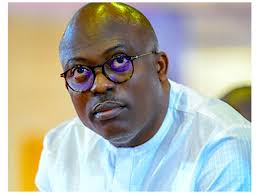In considering proposals contained in the 2023 – 2025 Medium Term Expenditure Framework (MTEF) and Fiscal Strategy Paper (FSP), Senate Committee on Finance had interface with heads of various Ministries , Departments and Agencies (MDAs), Taiye Odewale reports
Purpose of the interface
As clearly stated on Tuesday, September 13, 2022 when the Senate Committee on Finance started the five days interactive sessions it had with heads of the various federal government-owned Ministries, Departments and Agencies (MDAs), the Chairman of the Committee, Senator Olamilekan Solomon Adeola (APC Lagos West), said the purpose for the interactive sessions, was to arrive at better proposals in terms of targeted revenues and budget implementation devoid of excessive deficits and borrowings.
Presentations by Finance Minister and others
The Minister of Finance, Budget and National Planning, Mrs Zainab Ahmed, had in her presentation before the committee, said the federal government was proposing an aggregate expenditure of N19.76 trillion for the 2023 fiscal year.
She said the federal government may not in the 2023 fiscal year, able to make provision for treasury funded capital projects as deficit in the proposed budget will either be N11.30 trillion or N12.41trillion depending on the choice that would be made by the federal government on the issue of fuel subsidy payments.
She added that the federal government was projecting total revenue of N8.46 trillion, out of which N1.9 trillion was expected to come from oil-related sources while the balance would come from non-oil sources.
Basic assumptions or parameters for the proposed N19.76trillion budget as submitted by her are: $70 oil price benchmark per barrel, projected daily oil production of 1.69million, exchange rate of N435.57 to a dollar, 3.7% real Gross Domestic Product (GDP) growth rate and 17.16% inflation rate.
She lamented that revenue generation had remained a major fiscal constraint for the country,which resulted into the proposed N11.30 trillion budget deficit for 2023 from N7.35 trillion in 2022, representing 5.01 per cent of the estimated GDP above the three per cent threshold stipulated in the Fiscal Responsibility Act (FRA), 2007.
“This deficit level assumes that petrol subsidy reform will be implemented from mid-2023 in line with the timeline for suspension thereof”, she stressed.
After the Minister’s presentation, the Comptroller – General of Nigeria Customs Service (NCS) Col Hammed Ali (rtd), Chairman of the Federal Inland Revenue Service (FIRS), Muhammad Nami etc, followed suit with narrative of inadequate revenue generation to fund yearly budget proposals.
Committee’s reaction
Worried by the submissions, the Committee Chairman, Senator Solomon Olamilekan (APC Lagos West), told the Minister that both the projected N12.43trillion budget deficit and N6trillion tax and import duty waivers should be critically reviewed downward before sending the proposals to the National Assembly for consideration and approval.
He specifically told the Minister to look into the list of beneficiaries of the waivers for required downward review to N3trillion with attendant reduction of N12.43trillion deficit figure.
“The proposed N12.43trillion deficit for the 2023 budget and N6trillion waivers are very disturbing and must be critically reviewed.
“Many of the beneficiaries of the waivers are not ploughing accrued gains made into expected projects as far as infrastructural developments are concerned.
“The same goes for tax credit window offered by FIRS to some companies.
“Billions and trillions of Naira can be generated by government as revenue if such windows are closed against beneficiaries abusing them and invariably provide required money for budget funding with less deficit cum borrowings.
“The Nigeria Customs Service should help in this direction by critically reviewing waivers being granted on import duties for some importers just as the FIRS should also review the tax credit window offered some companies without corresponding corporate social services to Nigerians in terms of expected project executions like road construction.
“Generally, the issue of waivers should be taken strongly by relevant authorities because Nigeria does not have the capacity for now. We cannot accommodate this N6trillion tax waivers”, he said.
Assurance on improved performance by FIRS boss
But the FIRS Chairman told the committee that tax credit is an important innovation of government which has yielded positive results from September 2019 when it was introduced through Executive order 007 by President Muhamnadu Buhari .
He urged the committee not to move in the direction of scrapping it as it is only given to companies with evidence of projects execution.
“Out of the N6.08trillion projected revenue from January to July 2022, FIRS generated N5.59trillion giving strong indication that the N10.4trillion projected for the year, will be achieved”, he assured.
Threats against non – revenue generating MDAs
On the second day of the interactive session with heads of many other MDAs, the Senator Adeola led committee , warned them against imminent scrapping as recommended by Steve Orosanye rationalisation presidential committee.
For the committee, it cannot be business as usual for many of the MDAs being fully funded by government through budgetary provisions with little or nothing in return, in terms of revenue generation.
“Four hundred out of the close to 600 MDAs, risk scrapping as Orosanye panel recommended retention of just 106”, he warned.
Specifically, Senator Adeola’s warning came to the fore when the Director General of National Biosafety Management Agency (NBMA), Dr Rufus Ebegba made presentation of low revenue generation by the agency to the committee.
The DG in his submission said only N2million has been generated by NBMA this year as against N5million it usually generates on yearly basis and that, out of the N25billion appropriated for capital budget this year, only N1.3billion has been released.
Irked by the poor revenue generation, Senator Adeola told the Biosafety Management Agency boss, that it was unacceptable for an agency spending N500million a year outside capital projects to be remitting N5milllion into government coffers.
He declared that the time for such low revenue generation by any government agency was over, as those not meeting up, will be scrapped as recommended by the Orosanye panel.
“There is no way in stopping the implementation of Orosanye panel because of economic situation at hand in the country.
“Government needs revenue for impactful budget implementation, particularly in the area of projects execution and can no longer afford to be dolling money to MDAs without corresponding returns on yearly basis .
“We in the Senate are in support of implementation of the Orosanye led panel report to save the economy from self – inflicted bleeding “, he said.
The committee got infuriated further with submission made by the Managing Director of Sokoto Rima River Basin Development Authority (SRRBDA), Engineer Buhari Bature Mohammed who said out of the N7billion collected from government as funding for year 2022, only N7million revenue has been generated.
It consequently declared that Orosanye report should be applied on agencies with yearly low revenue generation.
ICPC’s bombshell on alleged budget paddings by MDAs
On the third day of the interactive session between the Committee and heads of relevant MDAs, startling revelations made by the Chairman of Independent Corrupt Practices and other Related Offences Commission (ICPC), Professor Bolaji Owasanoye, on alleged padding of yearly budgets by various MDAs through duplication of projects, took the front burner of deliberations.
“N300billion would have been wasted by the federal government on duplicated projects inserted into the 2021 budget and N100billion for same purpose in the current fiscal year if not tracked and intercepted by ICPC.
“The same preemptive move , saved the country from spending N49.9billion for salaries of ghost workers put on fictitious pay roll by the fraudulent MDAs between January and June this year .
“Names of MDAs involved in projects duplications running into intercepted billions of Naira and fictitious pay rolls , are available and will be forwarded to the committee .
“The good thing about the preemptive moves made by us is that monies for the fraudulent acts were prevented from being released to the affected MDAs and it is gratifying that the Finance Ministry and Accountant General Office cooperated with us”, he said.
He advised relevant committees of the National Assembly to be on the look out for such projects duplication in the proposed N19.76trillion 2023 budget .
“From our own end , detection of such projects are done by verifying their locations and names , upon which we tell the appropriate authorities not to release wrongly budgeted monies for them “, he added.
At the end of the five day interface the committee had with heads of relevant MDAs, it resolved that the proposed N11.30trillion deficit in the projected N19.76trillion 2023 budget, will be reduced drastically through increased revenue generation by the MDAs.
But whether the committee and by extension, the National Assembly, will succeed in achieving that, will be seen after the consideration and passage of the about to be presented 2023 budget by President Muhammadu Buhari.




